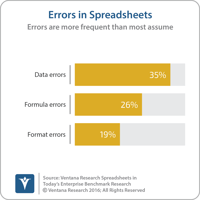Accountants love electronic spreadsheets – and for good reason. They’re a powerful and versatile personal productivity tool and just about everyone knows how to use them. Spreadsheets are the default software tool for accountants because they enable autonomy (you don’t need to ask IT for anything) and they’re free (so you don’t have to make a business case to authorize buying something). Some accountants humorously (but earnestly) invoke the line “you’ll have to pry this spreadsheet from my...
Read More
Topics:
ERP,
Office of Finance,
Continuous Accounting,
FASB,
IASB,
CFO,
controller,
Financial Performance Management,
Spreadsheets,
Enterprise Resource Planning,
ERP and Continuous Accounting,
revenue recognition,
Accounting,
Lease Accounting,
real estate,
Lease Management,
ASC842,
IFRS16,
leasing
Read More
Topics:
Office of Finance,
closing,
Controller,
FASB,
IASB,
IFRS,
XBRL,
financial performance,
Analytics,
Business Analytics,
Business Intelligence,
Business Performance,
Financial Performance,
Governance, Risk & Compliance (GRC),
CFO,
financial statement,
GAAP,
SEC
The melding of the world’s two main financial accounting standards – United States Generally Accepted Accounting Standards (US-GAAP) and International Financial Reporting Standards (IFRS) – continues apace. Initially, the idea was to converge the two into a single, global standard. Although there was general agreement that the concept was a noble one, there were enough differences to produce practical concerns about implementing these changes, especially in the United States. Then, in December...
Read More
Topics:
Office of Finance,
Controller,
FASB,
IASB,
IFRS,
XBRL,
Financial Performance,
CFO,
financial statement,
GAAP,
SEC
Hans Hoogervorst, who just succeeded Sir David Tweedie as the chairman of the International Accounting Standards Board (IASB), recently said he is “optimistic the SEC will move to fully incorporate IFRS [International Financial Reporting Standards] shortly.” I find it hard to see why, unless one has a fairly elastic definition of “fully,” “incorporate” and “shortly” (or at least two out of three). Then again, one shouldn’t fault the head of an organization for expressing undue optimism since...
Read More
Topics:
Office of Finance,
Reporting,
Consolidation,
FASB,
IASB,
IFRS,
Business Analytics,
Business Collaboration,
Business Performance,
Financial Performance,
GAAP,
SEC










